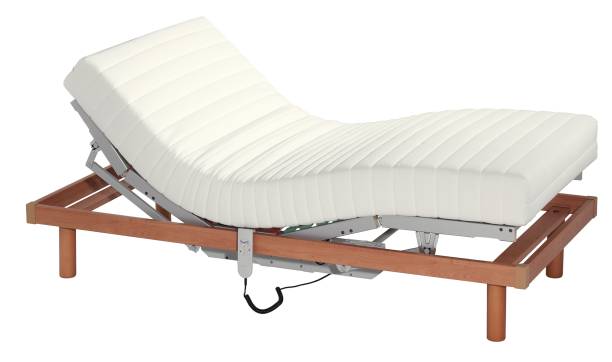Introduction

Parkinson's can present various challenges, as its symptoms can significantly impact daily life. From tremors and stiffness to sleep disturbances and fatigue, those with Parkinson's often seek ways to manage their symptoms effectively. While medical interventions and lifestyle modifications are commonly explored, one aspect that may be overlooked is the role of bedding in influencing Parkinson's symptoms.
In this blog post, we will delve into the potential impact of bedding choices on Parkinson's symptoms and explore strategies to optimize sleep quality and overall well-being for individuals with this neurodegenerative disorder. Join us as we uncover the connection between bedding and Parkinson's and discover ways to enhance your sleep environment for better symptom management.
What are the symptoms of Parkinson's?
The symptoms of Parkinson's vary from person to person, but the most common ones include:
-
Tremors (involuntary shaking) in the hands, arms, legs, jaw, and face.
-
Stiffness or slowing of movement.
-
Difficulty with balance and coordination.
-
Problems with speech and writing.
Other signs may include depression, anxiety, fatigue, and memory problems. Symptoms usually begin gradually but can progress over time. Treatments can help manage symptoms and improve quality of life.
How is Parkinson's Diagnosed?
Diagnosis of Parkinson's is based on the patient's medical history, a neurological exam, possibly imaging tests such as an MRI or CT scan, and sometimes blood tests. Diagnosis can be difficult because the symptoms of Parkinson's are similar to those of other neurological disorders. An accurate diagnosis is important for treatment planning. More recently, researchers have identified a biomarker for Parkinson’s that can improve the accuracy and efficiency of a Parkinson’s diagnosis. This new investigational research tool can detect the “Parkinson’s protein” and identify Parkinson’s with 93% accuracy. This discovery will surely transform Parkinson’s care including earlier diagnosis and targeted treatments.
Is Your Bedding Affecting Your Parkinson's Symptoms?
Parkinson's disease is a neurological disorder that affects millions of people worldwide. While the primary symptoms of Parkinson's include tremors, stiffness, and difficulty with movement, various factors can impact the severity of these symptoms. One often overlooked aspect is the bedding we use. We will explore the potential relationship between bedding and Parkinson's symptoms, considering the role of comfort, frictional resistance when moving, temperature regulation, and allergens.
Comfort and Sleep Quality:

Quality sleep plays a crucial role in managing Parkinson's symptoms. The right bedding can significantly impact sleep quality and overall comfort. People with Parkinson's often experience muscle stiffness and pain, affecting their ability to find and to move into a comfortable position. Choosing a mattress, pillows, and bedding materials that provide proper support, good mobility and pressure relief can improve sleep and potentially alleviate some Parkinson's symptoms.
Temperature Regulation:
Many individuals with Parkinson's disease experience temperature regulation issues. They may struggle to maintain a comfortable body temperature during sleep, leading to excessive sweating or feeling too cold. Bedding materials that help regulate body temperatures such as breathable and moisture-wicking materials, can aid in maintaining a comfortable sleep environment and reduce discomfort caused by temperature fluctuations.
Allergens and Irritants:
Some bedding materials, such as certain synthetic fabrics or down feathers, can harbor allergens and irritants that may trigger respiratory issues or skin sensitivities. People with Parkinson's are not immune to these allergic reactions, and the resulting discomfort can exacerbate their symptoms. Opting for hypoallergenic bedding, regularly washing bedding in hot water, and using dust mite covers can help minimize exposure to allergens and create a healthier sleep environment.
Bedding Adjustability:
Individuals with Parkinson's disease often experience changes in mobility and muscle stiffness throughout the progression of their condition. Adjustable beds or mattress bases can provide added convenience and comfort. Elevating or adjusting specific sections of the bed can assist with finding the most comfortable sleeping position, easing muscle tension, and promoting better sleep quality.
Are there any specific bedding accessories that can help alleviate Parkinson's symptoms?
Yes, some bedding accessories can help alleviate Parkinson's symptoms. For instance, a body pillow or wedge-shaped cushion may help reduce nighttime discomfort and make it easier to stay in the same position while sleeping. Special cushions designed for people with Parkinson's are also available, which offer extra support and padding to provide additional comfort while sleeping.
An adjustable bed may also help redistribute pressure points and allow easier transitions between positions during sleep. Combining these accessories can help ease nighttime discomfort and reduce the frequency of involuntary movements associated with Parkinson's disease.
Finally, it is important to note that while special bedding may provide some relief for people with Parkinson's, it should not replace other treatments prescribed by a doctor. When considering bedding accessories to ease Parkinson's symptoms, talking with your healthcare provider about the best options for your situation is important.
Bed Types to Consider When You Have Parkinson's
When you have Parkinson's, finding the right bed can make a huge difference in your quality of life. Fortunately, many different types of beds are available that can suit your needs and help reduce any physical discomfort you may experience. Here are some considerations to keep in mind as you look for the perfect bed:
Adjustable Bed Base:

An adjustable bed base can provide comfort and support throughout the night by allowing you to adjust your sleeping position as needed. This feature is especially beneficial for individuals who experience difficulty getting in and out of bed or have issues with positioning.
Memory Foam Mattress:
Memory foam mattresses are designed to provide greater pressure relief and contour to the body's curves so that you can enjoy a more comfortable night's sleep. Memory foam mattresses may also help alleviate pain associated with Parkinson's symptoms, such as stiffness or tremors. However, it is also important to consider the ease of moving on memory foam as some people find changing positions more difficult on this base. Be sure to compare ease of moving with other firm mattress types. When moving is easier, it becomes more spontaneous and frequent which, in turn, can reduce pain and stiffness associated with staying in one position for prolonged periods.
Firm Mattress:
A firm mattress is often recommended for people with Parkinson's because it can help support the entire body while you sleep. It is important to find a mattress that offers enough support but also allows for some give so that your body weight is evenly distributed.
By exploring these options, you can find the perfect bed to fit your needs and help reduce any physical discomfort caused by Parkinson's symptoms. Is your bedding affecting your Parkinson's symptoms? Find out more about the types of beds that can help you get a better night's sleep.
Should people with Parkinson's consider using weighted blankets for better sleep?
Weighted blankets are a growing trend associated with many potential benefits in the health and well-being industry. For people with Parkinson's, weighted blankets may offer an additional way to manage symptoms like anxiety or restlessness. However, they can make moving more difficult as many people with Parkinson’s must first sit up to turn to one side or the other. The weight of the blanket can be excessively heavy and deter repositioning that is essential to comfort, safety and health. By using friction-reducing sheets and sleepwear, it becomes possible to turn without having to sit up first. Such a combination, weighted blanket PLUS mobility-enhancing, friction-reducing sheets and sleepwear, can be the best of both worlds for improved relaxation, comfort, mobility and sleep.
Weighted blankets provide deep pressure stimulation (DPS), similar to hugging, swaddling, or being held. DPS increases the production of serotonin and dopamine in the brain, which helps to reduce anxiety and improve sleep. It's believed that weighted blankets could help people with Parkinson's manage symptoms such as restlessness and fatigue, making it easier to get a good night's rest.
However, it's important to note that weighted blankets are not a cure for Parkinson's and should not be used as a substitute for medical advice. If you or someone you know is considering using a weighted blanket, it's best to speak with your doctor first to ensure it will be safe and effective for them.
Weighted blankets are just one way to help manage Parkinson's symptoms. Exercise, dietary changes, and other lifestyle modifications can also help people with the condition feel more comfortable in their skin. Is your bedding affecting your Parkinson's symptoms? Make sure to explore all of the options available to get a good night's rest.
Does the type of pillow used have any impact on Parkinson's symptoms?
When it comes to the quality of sleep for people with Parkinson's, the type of bedding can make a huge difference. Soft and comfortable pillows can help reduce restless nights by supporting your head and neck. Pillows that are too soft may cause extra strain on the muscles in the upper body, while overly firm pillows can cause neck and shoulder pain.
For people with Parkinson's, finding a pillow that provides the right support is essential for a good night's rest. Memory foam or adjustable pillows are better choices than traditional feather or down pillows, as they provide superior support while conforming to your body shape. An adjustable pillow can also be tailored to provide the perfect comfort level for your individual needs.
When selecting a pillow, it's important to keep in mind that the type of bedding you choose may have an impact on your Parkinson's symptoms. For example, a firmer mattress and higher pillows can often help reduce nighttime restlessness and improve sleep quality. On the other hand, softer bedding materials may be more comfortable but can also cause a decrease in restful sleep.
If you have Parkinson's, it's important to take the time to find the best type of pillow for your situation. The right pillow can make all the difference in getting a good night's rest and managing your symptoms. Is your bedding affecting your Parkinson's symptoms? Make sure you find the best type of pillow for you.
FAQ's
What specific aspects of bedding can impact Parkinson's symptoms?
Bedding can impact Parkinson's symptoms in various ways, including ease of mobility, comfort, support, and temperature regulation. A comfortable mattress that provides adequate support for the body can help reduce stiffness and pain associated with Parkinson's symptoms. This is especially true when used in combination with mobility-enhancing sheets and sleepwear.
Can temperature regulation in bedding and sleepwear affect Parkinson's symptoms?
Yes, temperature regulation in bedding and sleepwear can affect Parkinson's symptoms. For people with Parkinson's, cooler temperatures are more comfortable and may help reduce restlessness and pain associated with the condition. Additionally, a mattress protector or pad can help regulate body temperature and provide extra comfort during the night.
How do you calm down Parkinson's?
There are several ways to help calm Parkinson's symptoms. Exercise, dietary changes, and relaxation techniques can all be beneficial for managing the condition. Finding the right bedding materials, such as a supportive mattress or adjustable pillows, can help improve sleep quality and reduce restlessness during the night. Speak with your doctor to determine which methods may be best for you.
Do Parkinson's symptoms go away during sleep?
In general, Parkinson's symptoms do not go away while sleeping, but there are ways to reduce the severity of symptoms. A comfortable mattress, sheets and sleepwear, and pillow that provides adequate support is essential for a good night's rest.
What can make Parkinson's symptoms worse?
Stress, too much caffeine or alcohol consumption, and changes in routine can make Parkinson's symptoms worse. An uncomfortable mattress or inadequate bedding materials may also increase symptoms like pain and restlessness. Finding the right bedding for your needs can help reduce any physical discomfort caused by Parkinson's symptoms.
Conclusion
I hope this article has helped you understand how bedding can impact Parkinson's symptoms. Remembering that the right bedding materials and a comfortable sleeping environment can make all the difference in getting a good night's rest. Is your bedding affecting your Parkinson's symptoms? Make sure you find the best type of bedding for your individual needs.

